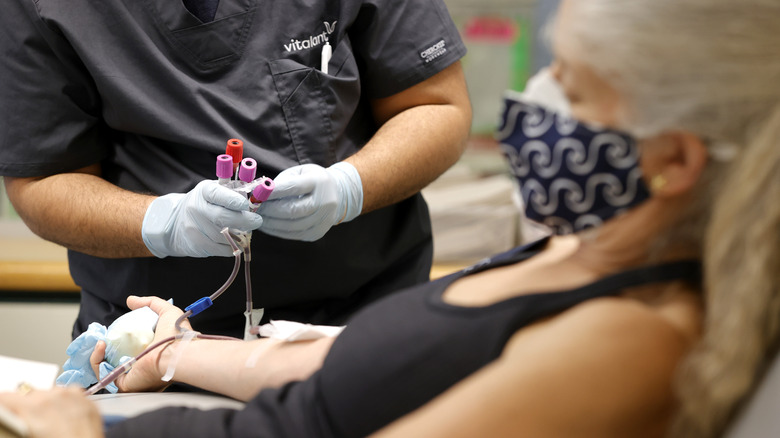A New Blood Test Could Be A Game Changer In Detecting Signs Of Cancer In Healthy People
A cancer diagnosis is a reality for many people, old and young. According to the Centers for Disease Control (CDC), over 1.6 million Americans are diagnosed with cancer each year. In an effort to lower those numbers, the CDC recommends eliminating risk factors such as smoking, excessive sun exposure, heavy alcohol consumption, and obesity. Cancer screenings, such as mammograms and colonoscopies, have been essential in helping doctors detect cancer in its early stages and promote cancer prevention.
However, screenings are not available for all types of cancers. Unfortunately, this leads to late detection and poor treatment prognosis. Even with screening, some cancers may be missed or the results may yield a false-positive (via American Cancer Society). This can lead to unnecessary stress and cost associated with additional testing and treatments. However, according to ABC News, a new test may be able to detect cancer much earlier than other tests or scans.
Blood test may detect cancer without signs or symptoms
Joyce Ares, a healthy 74-year-old, submitted a blood sample for cancer research. The blood test revealed that cancer was present. After additional tests, she was diagnosed with Hodgkins Lymphoma. With chemotherapy and radiation, she is now cancer-free. Previously, the blood test that detected Joyce's cancer had been used to monitor tumors and alter treatments for cancer patients. Now Grail, a new company, is working to commercialize the blood test to detect cancer, even in the absence of cancer signs or symptoms (via ABC News).
According to Dr. Joshua Ofman, a Grail executive, the new blood test has the advantage of detecting multiple cancers while traditional screenings only detect one cancer at a time. However, some health experts are concerned that the blood tests may lead to over-treatment of cancers that may not pose a threat to a person's life if left untreated, according to ABC News.
Dr. Barry Kramer, a former director of the National Cancer Institute's Division of Cancer Prevention, believes there's no way to know if the test added more healthy years to Joyce's life or not. "Cancer treatments can have long-term side effects," he said, "and we don't know how fast the tumor would have grown," via ABC News. At this point, health experts do not consider a positive blood test a cancer diagnosis and additional scans and tests will be needed to confirm the diagnosis.


